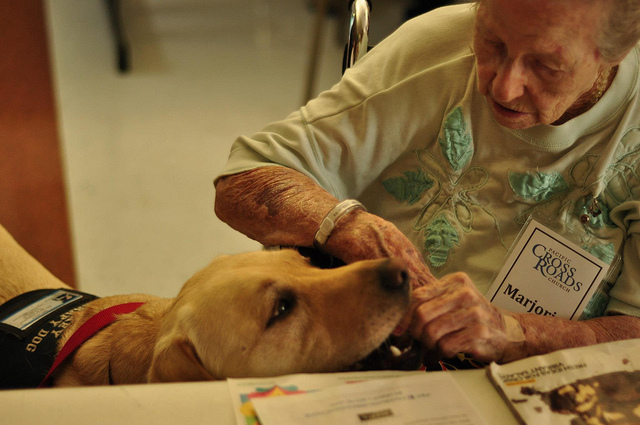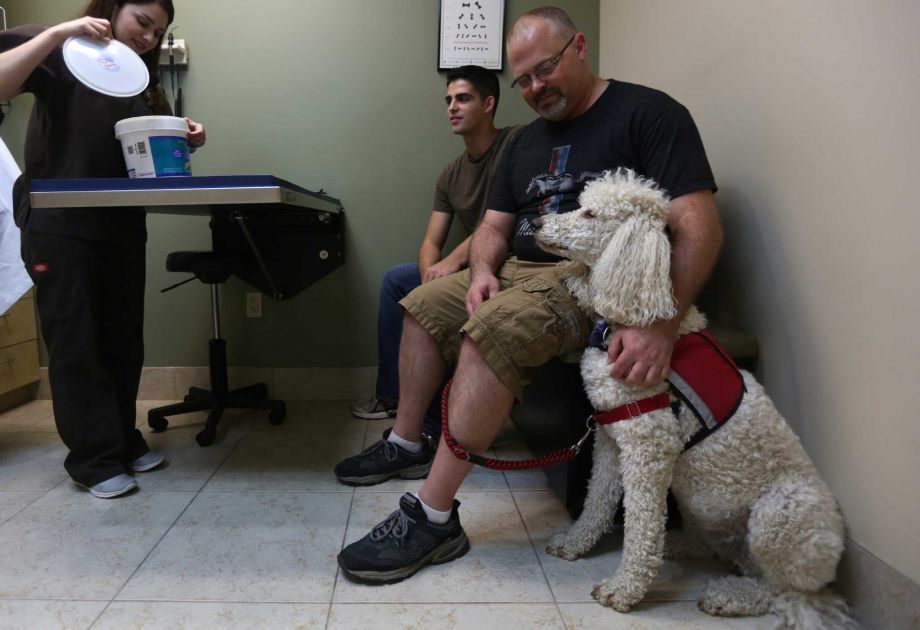Archive for the ‘Service Dog Tips’ Category
Highly trained service animals work for their owners with physical or psychiatric disability. There are different types of training as there are different types of work that the service dogs provide. These dogs assist their owners or masters to ensure that they can go on with their routines and activities without any incidents or problems. Above all, the service dogs must ensure their owner’s safety and health as it can become a life or death situation.
Below are just some of the tasks service dogs can do for individuals with disability or impairment, according to the International Association of Assistance Dog Partners:
Service Dogs Basic Tasks Answers when someone’s at the door by pulling a lever. Brings or retrieves stuff to its owner, such as the mail, medicine bottles or any other items. Barks, summons or alerts someone in the other room, for the owner who cannot get to them. Helps his owner get around, or get up from his seat, or climb the stairs at the home or in public establishments. Be his owner’s steady support, in case he experiences an imbalance while doing activities. Carries medicine and other provisions for his owner in a specialized back pack. Service Dogs Tasks During Emergencies Brings the phone to his owner to call 911 or a relative. Knows how to bark at a speaker phone to signal for emergency. Interrupts or tags its owner during a trigger or psychiatric occurrence. Alerts other people when its owner is in distress. Leads other people to its owner, who could already be down on the floor after an episode or a suicide attempt, especially in cases of depression and mood disorders. Alert its owner in cases of fire or burglary attempts.Service Dog Tasks
Psychiatric Service Dog ServicesPsychiatric service dogs provide assistance to people with mental health disabilities navigate through life. Similar to other service dogs, psychiatric service dogs are trained to assist their handlers by performing these tasks:
Guide a disoriented handler – for people on medications or in the middle of a disassociated Provide tactile stimulation for anxiety attacks, panic attacks, etc. Identify hallucinations – for people who experience hallucinations Search a room – for people with PTSD who are hyper-vigilant Interrupt and redirect – for people with OCD who may self harm themselvesPsychiatric service dogs can provide tremendous benefits for their handlers, outside the services they provide, so that the handlers can lead normal lives. Caring for a dog requires the handler to get out of the house and forces them to interact with the outside world. The simple act of having to get out of bed and getting fresh air can reverse the symptoms of depression in people. Emotional support animals can also provide these benefits to their handlers. Service dog and emotional support dog handlers report greater self-esteem due to the independence that they experience with their service dog or emotional support dog. Remember, in order to qualify for an emotional support dog you need an emotional support dog letter from a licensed health care professional.
Training for service dogs could take weeks and will depend on the tasks they have to learn and perform. Because of these tasks, the law, through the Americans with Disabilities Act, acknowledges that persons with disabilities or impairment need their service dogs at all times. Establishments and businesses are expected to recognize and afford individuals with service dogs the access or accommodation.
If you are experiencing any type of discrimination due to your need for a service animal, please contact the ADA.
Click on the links to get your service dog identification card or emotional support animal identification card.
If you believe that you have been discriminated against because of your service dog, you will need to present facts in order to file a complaint. You should be able to do that by documenting what happened. Writing everything down will help because you won’t be able to remember all the details when you do get a chance to report the incident.
Your notes are there to bolster your claims and a detailed account could help your case’s progress transpire faster. Here’s what you should write down when you document:
The time, date and place when the incident occurred. If possible, include the phone number of the establishment. The name of the person whom you believe discriminated against you. If you don’t have the name, a description of the person’s physical appearance will help. What transpired between you and the person involved. Write down what you said and what you heard the other person say. If the incident was covered in the news, keep newspaper clippings or video copies if it was on television. If you can, also get the names, address and phone number of the witnesses. You should also write down what you felt about being discriminated against.Filing A Complaint Against Discrimination
The next thing to do is file what you have documented at appropriate agencies such as the district court or your state’s Human Rights Commission. Make sure to check first because some states provide limited protection on service dogs’ cases.
You could also file through the Department of Justice by sending your documentation to the following address:
U.S. Department of Justice 950 Pennsylvania Avenue, NW Civil Rights Division Disability Rights – NYAVE Washington, D.C. 20530
Some incidents might require filing within a year of the incident. For more details about this, refer to the Americans With Disability page.
Lastly, you might also want to share the incident on internet sites like Ripoff Report and Trust Pilot.







